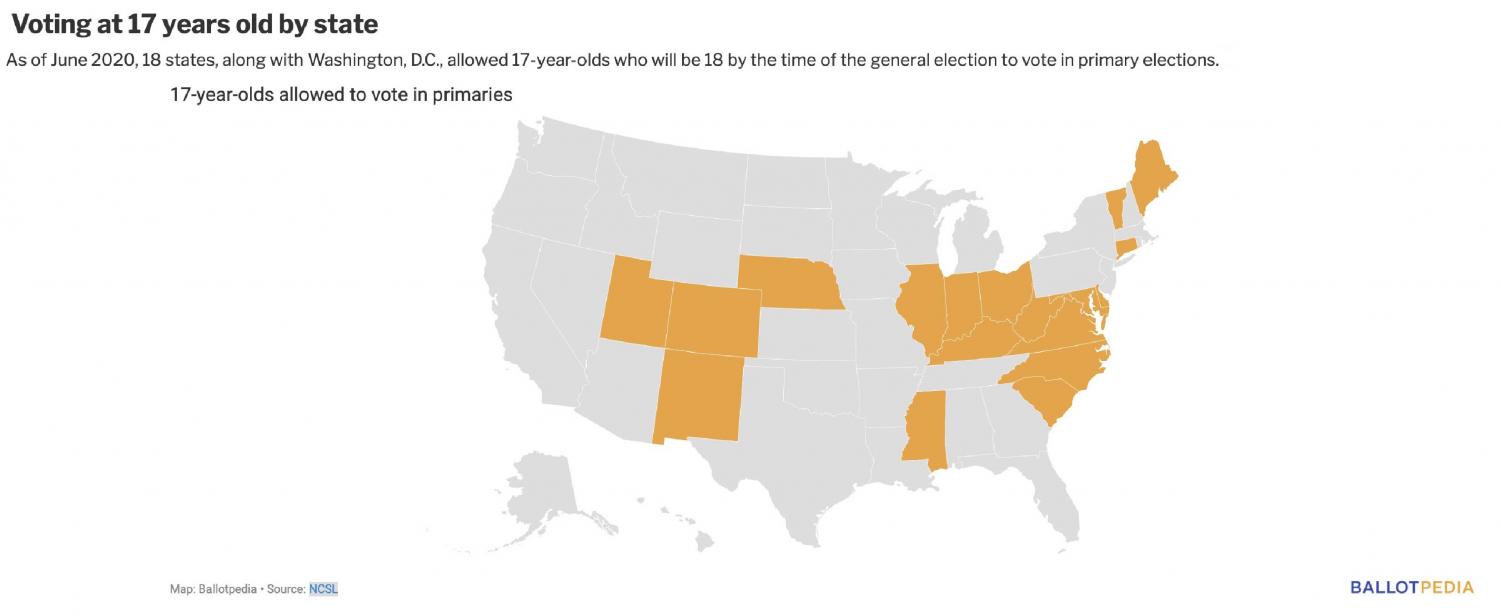California Proposition 18: What You Need To Know
October 30, 2020
California voters will see Proposition 18, the Primary Voting for 17-year-olds Amendment, on the ballot this Nov 3. This proposition will allow 17-year-olds to vote during primary elections so long as they turn 18 by the time of the general election. Mail-in ballots have started making their way to voters in California, so it is important to understand the propositions you are voting for or against.
A “yes” on the ballot means you support the constitutional state amendment to allow 17-year-olds to vote in primary and special elections, so long as they are 18-years-old by the next general election. A “no” would be in opposition of that. The California State Senate voted 31 to 7 to put Proposition 18 on the ballot.
Proposition 18 is stated on the ballot as such:
“Amends California Constitution to Permit 17-Year-Olds to Vote in Primary and Special Elections if They Will Turn 18 by the Next General Election and be Otherwise Eligible to Vote. Legislative Constitutional Amendment.”
The fiscal impact is stated underneath as such:
“Increased costs for counties, likely between several hundreds of thousands of dollars and $1 million every two years, to send and process voting materials to eligible registered 17-year-olds. Increased one-time costs to the state in the hundreds of thousands of dollars to update existing voter registration systems.”
Laura Wing, political science professor at California State University, East Bay, supports this proposition and says it will not be costly overall.
“Prop 18 has a relatively small fiscal impact – it is mostly just the cost of printing additional ballots each election cycle.” Wing said in an interview, “I feel the benefits of getting more people voting far outweigh any additional costs.”
But, what exactly is the difference between primary elections and general elections?
Ballotpedia.org is a digital encyclopedia of American politics and elections whose goal is to inform people about politics by providing accurate and objective information at all levels of government.
According to Ballotpedia, primary elections always happen well before general elections. The purpose of primaries is to either narrow the field of candidates for an elective office or to determine the nominees for political parties in advance of a general election. The purpose of a general election is to vote said candidates into the elective office.
For example, California’s primaries took place on March 3, 2020 which resulted in the nomination of Vice President Joe Biden for the Democratic Party nominee and President Donald Trump for the Republican Party nominee.
If 17-year-olds are given the opportunity to vote in primary elections, then they are able to choose the politicians they want to vote for when they can legally vote at the age of 18.
Olivia Zakas and Jake Zakas are 16-year olds who hold leadership positions at Castro Valley High School. If Proposition 18 passes, it would allow them to vote during the next election cycle.
“The decisions politicians are making right now are going to affect the lives of our generation and not theirs.” Jake Zakas said in an interview. “So we need to have more young votes counted and younger politicians in places of power.”
Similarly, Olivia Zakas said this election will have consequences for young people, which makes voter turnout among young people important.
“We’re actively fighting against an oppressive government right now,” Zakas said in an interview, referring to the actions of the Trump Administration. “That’s why it’s important for more young people to vote for the candidates we want in office, so we can effectively make the change we want to see in our country.”
Eighteen of the 50 states already have this law in place, allowing registered voters to vote at age 17 in primary elections, according to Ballotpedia.

Proposition 18 gives power to 18-year-old first-time voters by giving them a say in who the candidates are in general elections.
Some voters disagree with the effectiveness of Proposition 18. According to the Election Integrity Project of California, 17-year-olds are still considered legal minors and under the political influence of their parents, guardians, or school teachings. Most 17-year-olds are still in high school, which leads to the belief that they are less likely to make their own decisions.
However, Wing frequently hears students complain that they do not like the candidates of either major party. First-time voters in this general election had no say in which candidates are on the ballot, which can discourage young voters from even voting. If a large majority of young voters decide not to vote, then there is a chance that President Donald Trump can be re-elected.
“America was designed to be a representative democracy, to be a government that is elected by the people that carries out the will of the people.” Wing expressed, “Our government will never be truly representative if it is elected by only half of all eligible voters.”
Mail-in ballots were mailed out to registered voters in California on October 5, 2020. Voters have until November 3, 2020 to return their filled out ballots to a ballot drop-box located across the state. In-person polling stations will be open on October 31, 2020 until November 3, 2020.


